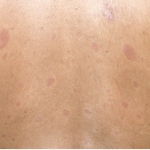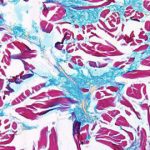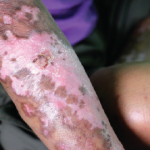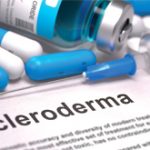NEW YORK (Reuters Health)—The pathology of pediatric psoriasis differs from that of adult psoriasis, a finding that has implications for treatment, researchers suggest. “Pediatric psoriasis often differs from adult psoriasis in presentation, triggers, natural history, and response to therapy, suggesting potential differences in the pathophysiology of the disease processes,” Dr. Kelly Cordoro of the University…

More Effective Antifibrotic Therapies for Systemic Sclerosis in Development; Adverse Events A Concern
Systemic sclerosis (SSc) is a rare disease affecting about 49,000 U.S. adults, and it is strongly associated with high levels of morbidity and mortality.1 Of the few available antifibrotic therapies, none is targeted for SSc. However, reason for optimism exists for antifibrotic treatments in early development and clinical trials, says Jörg H.W. Distler, MD, Heisenberg Professor…

Stem Cell Transplantation Shown to Improve Outcomes in Systemic Sclerosis
Rheumatologists now have another treatment option to offer their patients with one of, if not the most, difficult autoimmune diseases to treat. New data add to the growing evidence of the safety and benefit of stem cell transplantation for patients with systemic sclerosis with internal organ involvement. New results of the Scleroderma: Cyclophosphamide or Transplantation…
Tofacitinib Treatment May Improve Nail Psoriasis
NEW YORK (Reuters Health)—The oral Janus kinase (JAK) inhibitor tofacitinib appears to improve moderate to severe nail psoriasis, according to a new study. “Nails are hard to treat in psoriasis and we need better treatments,” says Dr. Luis Garza, a dermatologist at Johns Hopkins School of Medicine in Baltimore, who was not involved in the research….

What Rheumatologists Wish Their Colleagues Knew: Managing Skin Disease & Comorbidities
From treating rashes to uncovering a case of osteoarthritis, dermatologists and rheumatologists can work together in a variety of ways to improve patient care, says Joseph F. Merola, MD, MMSc…

Certolizumab Pegol Promising for Plaque Psoriasis in Phase 3 Trial
Certolizumab pegol has proved safe and effective for treating patients with plaque psoriasis in a Phase 3 clinical trial…

Distinct Autoantigens Found in Patients with Scleroderma & Coincident Cancer
Recent research examined the relationship between patients with scleroderma who are anti-CTP antibody negative and cancer. Combing two complementary technologies, PhIP-Seq and PLATO-BC, researchers identified the POLR3 complex in cancer-associated scleroderma…

Targeted Therapy for Scleroderma Fibrosis
Scleroderma, or systemic sclerosis (SSc), is an autoimmune disease characterized by vasculopathy and fibrosis. Although relatively rare, with a prevalence in North America of approximately 300 per 1 million people, SSc is associated with significant morbidity and high rates of mortality.1 Patients with scleroderma have four times greater mortality than age- and sex-matched controls, with…

Rheumatology Case Report: Concomitant Lupus with Features of Scleroderma, Castleman Disease
We report a case of a 27-year-old woman who was initially diagnosed with systemic lupus erythematosus (SLE), had features of scleroderma and was subsequently found to have lymph node biopsy consistent with multicentric Castleman disease (MCD). She also had serologic evidence of acute Epstein-Barr virus (EBV) infection (vs. reactivation of EBV). The occurrence of MCD…

Treatments for Scleroderma with Gastrointestinal Involvement Address Symptoms
CHICAGO—Nine out of 10 scleroderma cases include clinical signs of gastrointestinal (GI) involvement, with severe involvement associated with high mortality rates, but the pathology of this is not very well understood, a GI expert said at the ACR’s State-of-the-Art Clinical Symposium. That has left clinicians with a slate of treatments—anti-reflux, antimicrobials and prokinetics—that address only…
- « Previous Page
- 1
- …
- 5
- 6
- 7
- 8
- 9
- …
- 12
- Next Page »